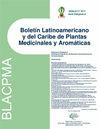Screening for acetylcholinesterase inhibition, lipid peroxidation inhibition and antioxidant activity of medicinal plants from Morocco
IF 0.7
4区 医学
Q4 INTEGRATIVE & COMPLEMENTARY MEDICINE
Boletin Latinoamericano y del Caribe de Plantas Medicinales y Aromaticas
Pub Date : 2023-01-30
DOI:10.37360/blacpma.23.22.1.1
引用次数: 0
Abstract
Acetylcholinesterase (AChE), hydrolyzes acetylcholine to choline and acetate, thereby terminating this neurotransmitter effect at cholinergic synapses. Therefore, AChE inhibition is used for counterbalance the cholinergic deficit in Alzheimer’s disease (AD) patients. In the present work, in order to find new plant acetylcholinesterase inhibitors, the hydroalcoholic extracts from seventeen medicinal plant species were screened for their acetylcholinesterase inhibition activity, as well as total phenolic (TPC) and flavonoids contents (TFC) and antioxidant activity using ORAC (Oxygen Radical Absorbance Capacity) assay, and their ability to inhibit lipid peroxidation. The results revealed that Rumex acetosa, Taraxacum officinaleand Hypericum perforatumextracts possessing the highest TPC and TFC, were the most effective in terms of ORAC antioxidant activity, and acetylcholinesterase inhibition, in addition to their ability to inhibit liposomes peroxidation, suggesting that those plant species may provide a substantial source of secondary metabolites, which act as natural antioxidants and acetylcholinesterase inhibitors, and may be beneficial in the treatment of AD.摩洛哥药用植物乙酰胆碱酯酶抑制、脂质过氧化抑制及抗氧化活性的筛选
乙酰胆碱酯酶(AChE)将乙酰胆碱水解成胆碱和醋酸盐,从而终止这种神经递质在胆碱能突触的作用。因此,AChE抑制被用于平衡阿尔茨海默病(AD)患者的胆碱能缺陷。为了寻找新的植物乙酰胆碱酯酶抑制剂,采用ORAC(氧自由基吸收能力)法对17种药用植物水醇提取物的乙酰胆碱酯酶抑制活性、总酚(TPC)和总黄酮(TFC)含量、抗氧化活性以及抑制脂质过氧化的能力进行了筛选。结果表明,在抗氧化活性、抑制乙酰胆碱酯酶活性和抑制脂质体过氧化作用方面,牛蒡、芦竹和perforatum提取物的TPC和TFC含量最高,表明这些植物可能提供了丰富的次生代谢产物来源,作为天然抗氧化剂和乙酰胆碱酯酶抑制剂。并且可能对阿尔茨海默病的治疗有益。
本文章由计算机程序翻译,如有差异,请以英文原文为准。
求助全文
约1分钟内获得全文
求助全文
来源期刊

Boletin Latinoamericano y del Caribe de Plantas Medicinales y Aromaticas
PHARMACOLOGY & PHARMACY-
CiteScore
1.30
自引率
14.30%
发文量
49
审稿时长
6-12 weeks
期刊介绍:
The Boletín Latinoamericano y del Caribe de Plantas Medicinales y Aromáticas (BLACPMA), [Latin American and Caribbean Bulletin of Medicinal and Aromatic Plants]; currently edited by the publishing house MS-Editions, is a bi-monthly international publication that publishes original peerreviewed research in the field of medicinal and aromatic plants, with nearly 20 years of experience. BLACPMA is a scientific journal that publishes two types of articles: Reviews (only in English) and Original Articles (Spanish or English), its main lines of action being agronomy, anthropology and ethnobotany, industrial applications, botany, quality and standardization, ecology and biodiversity, pharmacology, phytochemistry, pharmacognosy, regulatory and legislative aspects. While all areas of medicinal plants are welcome and the experimental approaches used can be broad and interdisciplinary; other areas of research that are not mentioned depend on the Editorial Committee for their acceptance.
 求助内容:
求助内容: 应助结果提醒方式:
应助结果提醒方式:


